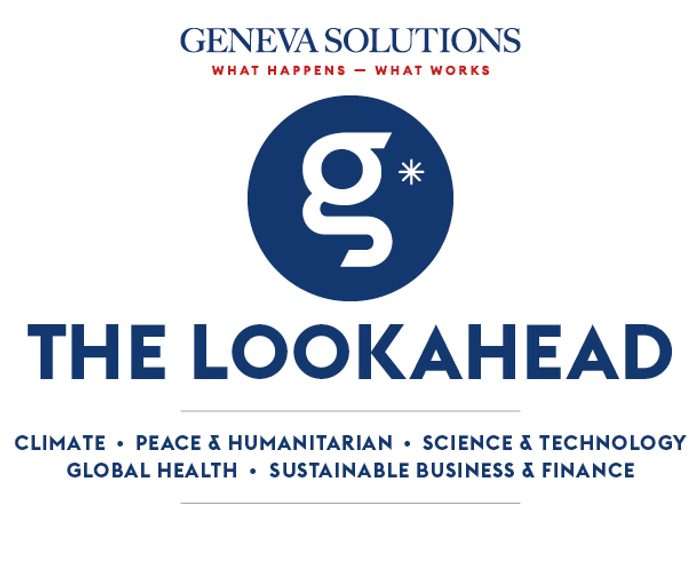Hello, this is Paula. Gender issues have become increasingly divisive at the UN Human Rights Council, with many western and Latin American countries fretting about a pushback on women's and LGBTQI+ rights into which conservative African and Muslim countries feel they're being strong-armed.
With that backdrop, countries will predictably butt heads as the summer session wraps up next week, when a number of gender and women's rights-related proposals will be considered. |

|

Representatives of the Catholic Church gathering after a side event on surrogacy was held in parallel to the Human Rights Council, 18 June 2024. (Geneva Solutions/Paula Dupraz-Dobias)
|
|
Tug of war over gender issues at the Human Rights Council.
In a year where gender has become a key campaign issue in a number of western elections, delegates at the United Nations Human Rights Council are also having to position themselves on a range of related subjects, often within ever more entrenched alliances. A flurry of initiatives has emerged in the last few years, putting the focus on gender – not without polarisation.
Geneva Solutions
|
|
|
🇺🇳HUMAN RIGHTS CONTINUED.
This is the third week of the Human Rights Council's 56th session in Geneva.
|
|
Opening act.
The freshly appointed UN special rapporteur on climate change Elisa Morgera will present her first report to the UN body, providing a taste of what the expert will focus on for the next three years.
The document maps out what human rights obligations states have concerning climate change, including curbing greenhouse gas emissions, adapting to weather impacts and compensating those who suffer from climate losses. The report also scrutinises solutions put forward, for example, in the form of climate technologies and carbon credits.
|
|
High stakes.
Less than a month ahead of the contentious presidential election in Venezuela, where the government banned opposition leaders from running as president Nicolas Maduro seeks to keep his grip on power, Volker Türk, the high commissioner for human rights, will report on the country’s human rights situation.
That includes its collapsing healthcare system, food insecurity and rising poverty, as well as the displacement of Indigenous people caused by illegal mining. The report comes four and a half months after Caracas kicked out the UN rights chief's steam from the country, further straining their relationship. Türk will have to weigh his words carefully this week so as not to anger Maduro, who signalled in April he may accept the return of the expelled staff.
The UN secretary general António Guterres also accepted last week a request from Venezuela's National Electoral Council to send a UN panel of electoral experts, who will observe the process and report back confidentially to Guterres.
|
|
Nothing to see here.
The council is also expected to adopt between Thursday and Monday the state-led Universal Periodic Review of China, Saudi Arabia and other countries’ rights records, conducted earlier this year. As expected, Beijing rejected all recommendations that refer to crimes against humanity, torture and the death penalty. Calls from the west to respect the rights of Uyghurs in Xinjiang, which were the object of some 33 recommendations, were among those rebuked.
|
|
Deadline alert.
States have until this Tuesday to table draft resolutions for the council to consider next week. Among the issues addressed by the proposals are curbing teen pregnancy, regulating firearms, the rights implications of plastic pollution, the rights of seafarers and free primary and secondary education.
|
|
🧕WOMENLESS FUTURE.
A Taliban delegation and the UN are gathered in Doha until today, in a first meeting critics say risk legitimising the gender aparthaid the de-facto rulers have imposed in Afghanistan. The exclusion of women from the conference was raised as proof of this by women’s rights activists.
As Afghanistan continues to spiral into a humanitarian catastrophe, the relief sector has been divided over how to deal with the fundamentalists now in control.
📖 To understand the dilemma: To aid or not to aid: behind Afghanistan’s divided relief frontlines
|
|
🤖WATCH OUT.
The World Intellectual Property Organization is due to release on Wednesday an interesting report revealing who’s leading the race to develop generative AI technologies like ChatGPT or Google’s Gemini.
|
|
- Michelle Langrand and Paula Dupraz-Dobias
|
|

|
|
Is Switzerland losing its leadership in digital governance?
Geneva, the birthplace of the World Wide Web and once a beacon to digital governance, is seeing its light grow dim. Faced with stiff competition, budgetary constraints post-Covid and geopolitical tensions, the capital of multilateralism is struggling to maintain its position in the field. Last month, the Internet Society decided to give up its offices in Geneva after a thirty-year presence in the city, in one warning sign of NGOs facing a high cost of living and a lack of funding. Geneva has also missed out on new opportunities. In 2022, the International Committee of the Red Cross (ICRC) picked Luxembourg for a new office dedicated to cyberspace.
Grégoire Barbey, journalist at Le Temps, will discuss his recent investigation along with Dr. Jovan Kurbalija from DiploFoundation, Francesca Bosco of the CyberPeace Institute and ambassador Thomas Schneider from the Swiss Federal Office of Communication. They will delve into the critical questions: Is Switzerland losing its edge in digital governance? Do the country's autorities still have the ambition to sustain Geneva's international digital leadership?
Don't miss our insightful event on Wednesday, 10 July, at 12:15 pm in partnership with the Geneva Press Club.
Sign up to attend in person at the Domaine de Penthes or join us online.
|
|
|
GS news is a new media project covering the world of international cooperation and development. Don’t hesitate to forward our newsletter!
Have a good day!
|

|
|
Avenue du Bouchet 2
1209 Genève
Suisse
|
|
|
|









